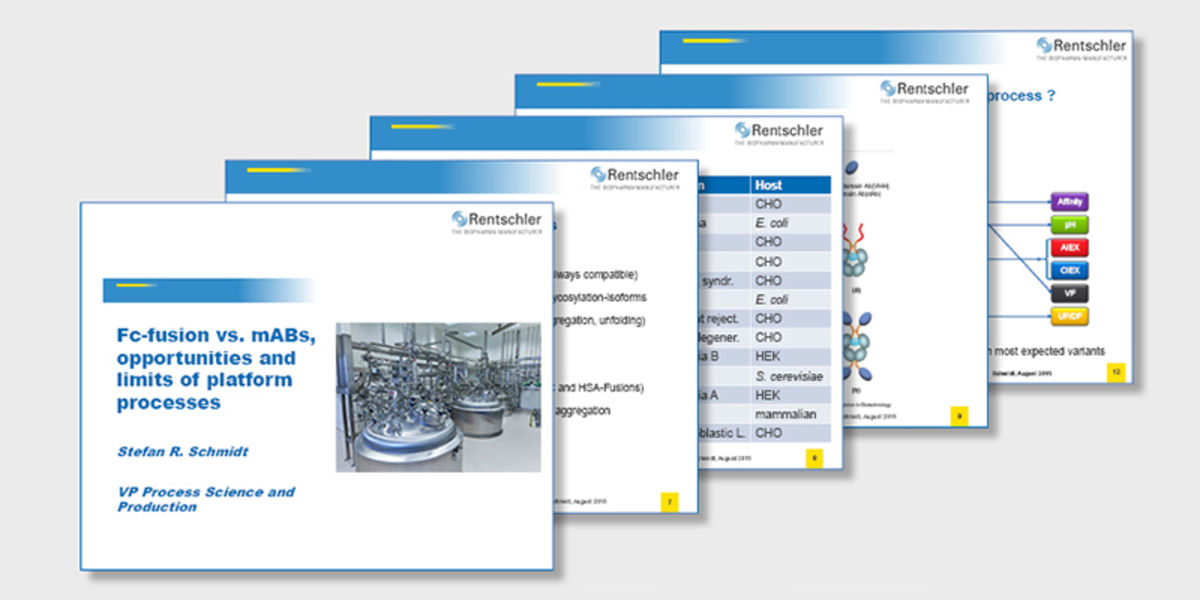The Seventh Annual Bioprocessing Summit in Boston vom 3.-7. August 2015

Rentschler präsentierte Expertise mit Prozess-Plattformen und modular konfigurierten Prozessen zur Expression und Aufreinigung von therapeutischen Proteinen
Vom 3. bis zum 7. August 2015 nahm Rentschler an der jährlichen, vom Cambridge Healthtech Institute organisierten The Seventh Annual Bioprocessing Summit in Boston teil. Mit 850+ Teilnehmern aus 29 Ländern konnte diese Veranstaltung wiederum eine Rekordbeteiligung verzeichnen.Die Besucher kamen sowohl aus dem akademischen Bereich als auch aus der biopharmazeutischen Industrie und erlebten in Boston zahlreiche inspirierende Präsentationen und praktische Demonstrationen zu vielen aktuellen Herausforderungen des Bioprocessing.
Die Besucher der Konferenz konnten unter fünf Streams wählen. Dazu gehörten bewährte Themen wie “Zellkultur & Zelllinienentwicklung”, “Formulierung & Downstream Processing” und „Analytik-Entwicklung & Qualität“, aber auch neue Schwerpunkte wie „Prozessinnovationen und Zelltherapeutika“ und „Regulatorisches und Risiko-Management“. Wichtige Diskussionspunkte waren passgenaue Bioreaktor-Volumina und durchgängige USP/DSP Single-Use-Systeme, hochkonzentrierte Proteinformulierungen, die frühe Analytik-Entwicklung für Biotherapeutika sowie die Zelltherapie-Bioproduktion.
Rentschler wurde auf der Konferenz durch Dr. Stefan Schmidt, Vice President Process Science and Production, vertreten. Schmidt hatte dabei verschiedene Funktionen inne. Er agierte als Chairperson und Top-Level-Panelist und stellte in zwei Vorträgen Rentschler’s breite Expertise mit antikörperähnlichen und Nicht-Antikörper-Molekülen dar.
Schmidts erster Präsentation unter dem Titel “Fc fusion vs. mABs, opportunities and limits of platform processes” folgten mehr als 200 Besucher des Zellkultur-Streams. Schmidt führte aus, dass Fc-Fusionsproteine sowohl im Upstream- als auch im Downstream-Prozess theoretisch mit MABs vergleichbar sein sollten. In der Praxis werden jedoch einige Differenzen beobachtet. Gut etablierte Plattform-Prozesse erfüllen die Anforderungen für Fc-Fusionsproteine nur teilweise. Typischerweise sind geringere Expressionsniveaus und eine ansteigende Tendenz zur Aggregation zu beobachten. Ausgehend davon diskutierte Schmidt eine Reihe von Manufacturing-Möglichkeiten für Fusionsproteine angefangen vom Plattform-Prozess über modulare Konzepte bis hin zu vollständig kundenspezifischen Lösungen. Die Eignung von Plattform-Prozessen für Fc-Fusionsproteine hängt davon ab, ob bestimmte Kriterien berücksichtigt werden können. Dazu gehört die Auswahl von Zelllinien mit hoher Produktivität und Viabilität, die Bestimmung der geeigneten Kapazität, Kontaktzeit und Eluierung für den Capture-Schritt, die Evaluierung von Größe- und Formlimitierungen und die Identifikation von sensitiven Parametern für die FcF-Stabilität. Andernfalls stehen die anderen von Schmidt genannten Möglichkeiten zur Verfügung.
Im Formulierungs- und DSP-Stream präsentierte Schmidt in einem zweiten Vortrag Rentschler’s Erfahrung mit verschiedenen komplexen, schwer zur exprimierenden Proteinen. Mit der Entwicklung innovativer therapeutischer Proteinformate gewinnen solche Moleküle zunehmende Bedeutung. Schmidt zeigte Möglichkeiten zur Entwicklung modularer, auf DOE-Prinzipien basierender Prozesse, die typische Herausforderungen wie die Kontrolle der Glykosylierung, die Erhöhung der Ausbeuten und die Verringerung der Aggregation meistern. In verschiedenen Fallstudien demonstrierte er erfolgreiches Prozess-Design basierend auf einem differenzierten modularen DSP-Ansatz, Optimierungsmöglichkeiten durch Benutzung generischer Puffer und Lösungen für Host- Cell-Protein- und Aggregationsprobleme.

